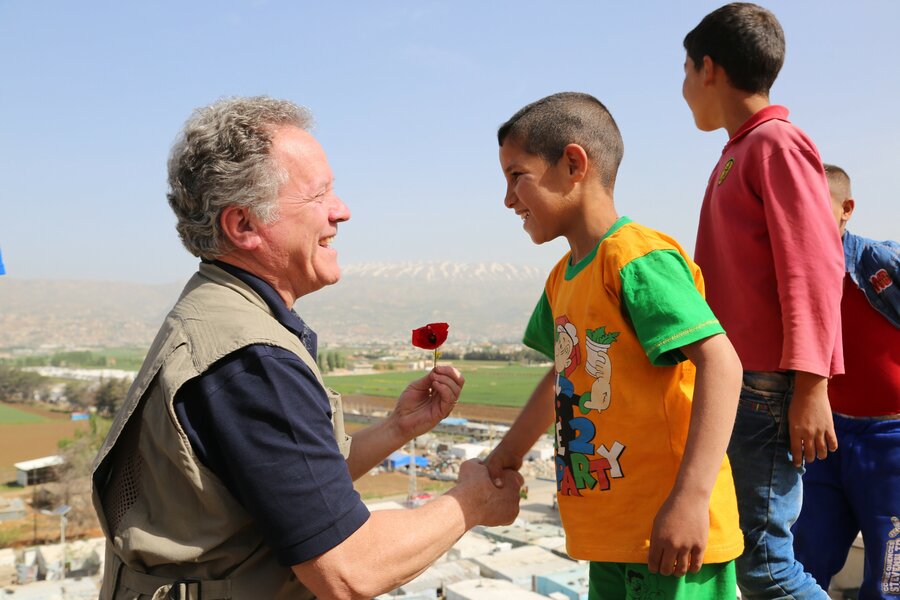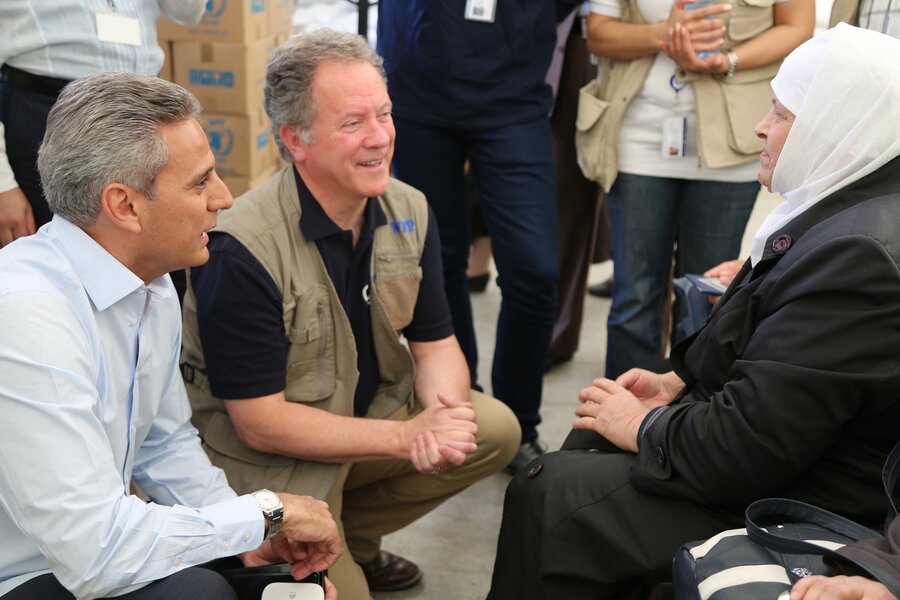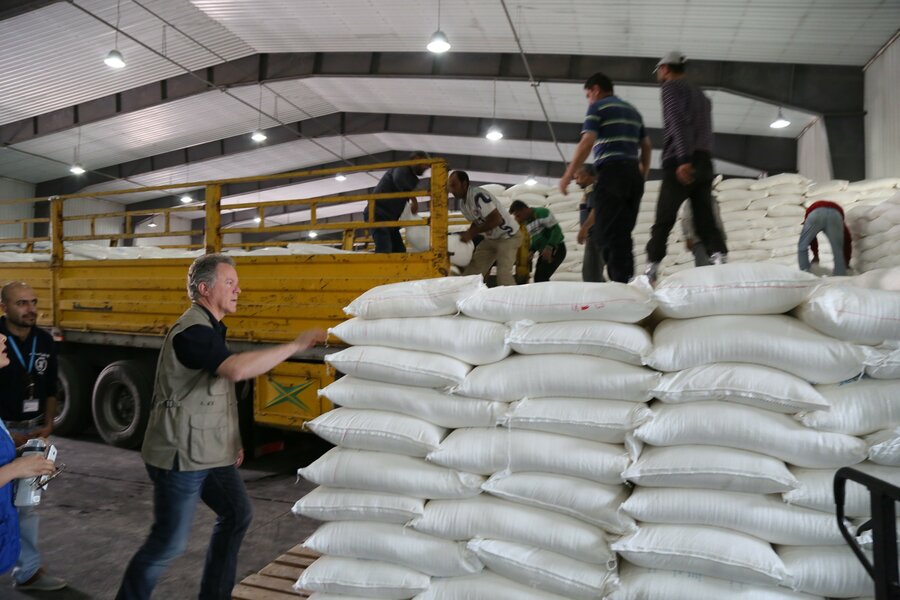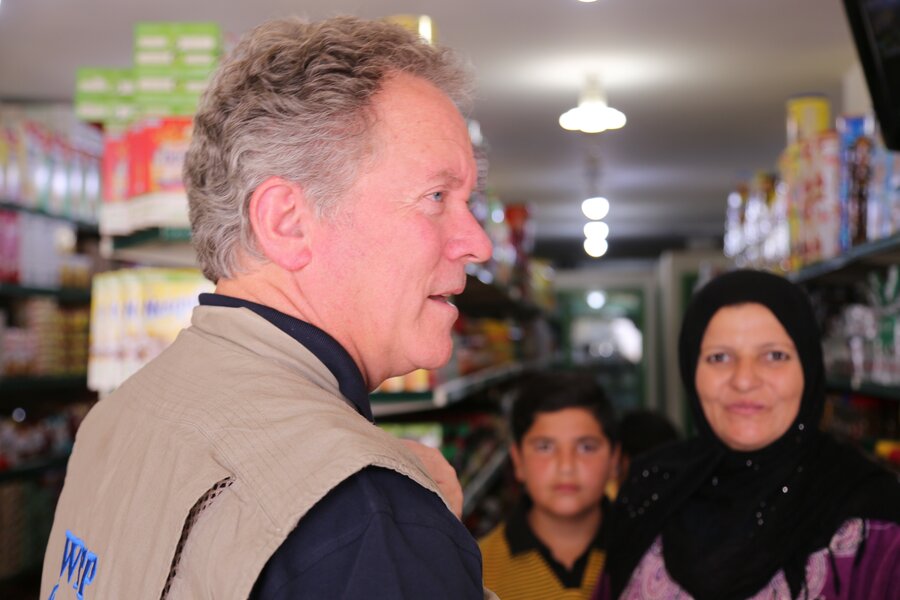Let us reach the people who need us most

My first visit to WFP field operations, in Lebanon and Syria, proved both a humbling and deeply moving experience.
Stories of suffering and of resilience, of families broken apart and yearning for a life of normality, surfaced again and again.
At a distribution centre in Damascus, women collecting boxes of food told me about losing loved ones in Syria's conflict, and of having to move repeatedly from place to place in order to survive. All they wanted was to be able to go home and live their lives again. It's just heartbreaking.
And yet amidst this conflict-laden area, children still smile and laugh — and they even greeted me with flowers. The welcome I received strengthened my resolve to do all I can, and to help WFP do all it can, to assist these families.
In Damascus I talked with Om Tarek, a mother in her seventies originally from Yarmouk camp. She sat waiting her turn to pick up her WFP food parcel, and I knelt down to speak to her. "Everyone here is good and kind to me," she said.
But life is hard now, as she has lost many family members in the conflict. "Everyone died, except for my four siblings," she said. Then she added something we should all remember: "But we are all brothers and sisters. We are one country. Syrians are all one family."
Since the early stages of the conflict in 2011, WFP has been on the ground in Syria, Lebanon and across the region. In Syria, we are providing life-saving food assistance to four million vulnerable people each month.

In Lebanon, millions of refugees are receiving food assistance through cash or through electronic vouchers in WFP-contracted shops. We are also building the resilience of the Syrian people, focusing on livelihoods, nutrition and access to primary education.
After seeing this work up close, I am convinced all the more that there's nobody better positioned in the world than WFP to help achieve an end to world hunger.
However, we can only carry out this type of work where we have unconditional, unimpeded, sustained and safe access to the millions of people in need across Syria, no matter where they are or who they are.
A total of 4.5 million people in Syria live in hard-to-reach and besieged areas, including 625,000 people in 13 areas that are completely cut off from the outside world. It is estimated that more than half of the people trapped in these areas face severe hunger.
I urge all parties to the conflict to respect international law and common humanitarian principles, so we can carry out the life-saving work upon which so many people depend for their survival.
Beyond this, the suffering of millions of Syrians will only be eased when a viable political solution to the conflict is reached, allowing families to return home and to rebuild their lives and their livelihoods.

In the meantime, WFP relies on the valuable support of donor countries — especially Germany, Canada and the United States — in helping people to put food on the table . We are truly grateful to these donors.
During my visit I also met families in the Bekaa Valley and in Beirut, Lebanon — families left with no choice but to abandon their homes and most of their possessions in Syria in order to survive.
Among those I spoke to was Fayza. She, her seven children and husband were forced to leave Deraa in southwestern Syria, and have sought refuge in Beirut. She depends on our vouchers to buy rice, eggs, cheese and milk, to put food on the table for her children so they can go to school and lead a normal life.
Fayza and her children don't want to be anywhere other than home. Yet they've got to go where their family will be safe and where there is food.
The Government of Lebanon has shown great generosity in giving refuge to these families. I was pleased to express WFP's appreciation directly to the President of Lebanon and to senior officials during our meetings. I know the Government is working very hard with WFP and other UN agencies to ensure people get the assistance they need.

We as an organization are doing all we can to reach those people most in need in Syria and Lebanon, people like the mothers, fathers and children whom I met with this past week.
It is a huge challenge. But with proper access to the people who depend on us, and with sufficient funding, we can ease their suffering in the short term. In the longer term, we can also help create the conditions where families can have the one thing they want more than anything else: a chance to go home.
David Beasley is Executive Director of the United Nations World Food Programme
